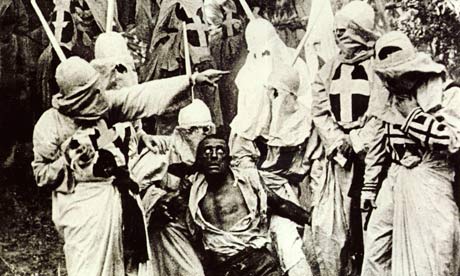"Time to murder some underwritten characters because of their race!"
I hadn't seen any John Ford until recently, when I saw 'The Searchers' in my Film Studies class. Although he is supposed to be the King of the Western, my only prior knowledge of his work had been a Quentin Tarantino interview I read around the time of 'Django's', where he was asked about his favourite Western directors. He cited Sergios Leone and Corbucci as key influences, and explained that he hated John Ford, principally because the celebrated director had a substantial (but uncredited) role in D.W. Griffiths' 'Birth of a Nation' as a Ku Klux Klan member. There is no need for me to explain how much hate and violence that "classic" (read; worthy of some Nuremberg-style litigation) film created. I've had people argue to me that Ford was a product of the era, and his environment, but I think that's bullshit. If you're intelligent and compassionate enough, you know the KKK are evil, regardless of whether or not 'The Clansman' was a big-selling book at the time. Charlie Chaplin didn't spend 1915 lending his talents to racist films that promoted the murder of black people. Years later, he was practically kicked out of the US for being too left-wing. People's ideologies are their ideologies.
"I never liked John Wayne films. Sexist and boring. xxx." - a text from my mother.
So, I saw 'The Searchers' and thought, though the film was artistically beautiful, the script was a crock of shit. It starts off with caricatured, "scary" Indians, devoid of emotion and personality, committing a basically inexplicable act of atrocity, which serves to justify John Wayne gleefully shooting them down for the next two hours. Then there's a scene that can only be described as some STUPID-ASS SHIT, wherein Wayne finds some white girls in a Native American camp, and it's implied that the entire tribe has taken it in turns raping them. They just sort of stand there gurgling. It's extraordinarily moronic. The least sexist thing about the film is that one of the female characters can read better than her male counterpoint.
Prior to my viewing of the film, I asked my lecturer why he didn't consider 'The Good, The Bad & The Ugly' one of the quintessential classics of the Western genre, and he implied that it was too trashy and violent. I think that's an extremely elitist view to take considering its level of influence on modern cinema, and I maintain that Leone's 'Dollars Trilogy' are markedly superior films, particularly in their resolute lack of Ford's ugly, patriarchal form of good ol' boy White Supremacy. Wayne's character is definitely a racist, but I've heard people argue that the film isn't. You can blame it on its time, but 'Casablanca' didn't have a dumb script, and that came out 14 years beforehand. Whilst screenwriting was not a talent Ford possessed, his choice in screenplays reflects his personal tastes and views. Judging from what I know of his work; they were abhorrent.
Prior to my viewing of the film, I asked my lecturer why he didn't consider 'The Good, The Bad & The Ugly' one of the quintessential classics of the Western genre, and he implied that it was too trashy and violent. I think that's an extremely elitist view to take considering its level of influence on modern cinema, and I maintain that Leone's 'Dollars Trilogy' are markedly superior films, particularly in their resolute lack of Ford's ugly, patriarchal form of good ol' boy White Supremacy. Wayne's character is definitely a racist, but I've heard people argue that the film isn't. You can blame it on its time, but 'Casablanca' didn't have a dumb script, and that came out 14 years beforehand. Whilst screenwriting was not a talent Ford possessed, his choice in screenplays reflects his personal tastes and views. Judging from what I know of his work; they were abhorrent.


Look at you challenging the lecturers!
ReplyDeleteA lot of people write Westerns off without realising just how broad a genre it is. As you mention, some are mindless, jingoistic shoot-em-ups where an arbitrary 'good guy' shoots arbitrary 'bad guys'. They bore me to the extent that I'd rather watch Mary Poppins.
At the other end of the scale of course there are epic, operatic tales that evoke memories of a time and a place where people were tested to their limits in an unforgiving landscape, and where conflict couldn't always be settled by the law.
Keep up the good work.
I definitely thought the "too violent" thing was a ridiculous criticism. Considering what a hideously amoral cesspit of corruption and abuse the West must've been, I can fault films in the genre for not being violent enough!
ReplyDeleteGlad you liked the article. Today I wrote/edited a presentation for film studies called "Representation of themes of existentialism in the films of Woody Allen." (I chose my own question) That might be the next post.
Keep up the good work yourself. Maybe if Harvey & I posted more we'd have more commenters, but you certainly do the job. Haha.